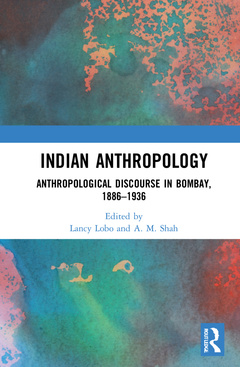Description
Indian Anthropology
Anthropological Discourse in Bombay, 1886–1936
Coordinators: Lobo Lancy, Shah A.M.
Language: English
Subject for Indian Anthropology:
Keywords
Plaster Of Paris; Vice Versa; Secretary Of State; Colonial Administration; Face To Face; Indian People; Conferred; Indian Anthropology; Bombay Province; North Western Provinces; Waterfall; Anthropological Society; Census; Follow; Bombay Presidency; Professor Flower; Part Iii; Totemistic Divisions; Jungle Tribes; Indian Ethnology; Chota Nagpur; Ahura Mazda; Negrito Races; Cultural Anthropology Perspective; Totem Theories
Publication date: 09-2023
· 15.6x23.4 cm · Paperback
Publication date: 09-2021
· 15.6x23.4 cm · Hardback
Description
/li>Contents
/li>Readership
/li>Biography
/li>
Indian Anthropology: Anthropological Discourse in Bombay 1886?1936 is an important contribution to the history of Indian anthropology, focusing on its formative period. It looks at the political economy of knowledge production and the anthropological discourse in Bombay during the late nineteenth century. This seminal volume highlights the much forgotten and ignored contribution of the Bombay Presidency anthropologists, many of whom were Indians, from different backgrounds, such as lawyers, civil servants, and men of religion, much before professional anthropology was taught in India. The other contributions are by pioneers from Bengal, Punjab, and United Provinces ? all British administrators turned scholars.
This volume is divided into three parts: Part I deals with the six contributions on the history of the development of anthropology in India; Part II deals with four contributions on the methodology and collecting ethnographic data; and Part III deals with four contributions on theoretical analysis of ethnographic facts. The roots of many contemporary conflicts and social issues can be traced to this formative period of anthropology in India.
This book will be useful to students and researchers of anthropology, sociology, public administration, modern history, and demography. It will also be of interest to civil servants, students of history, Indian culture and society, religions, colonial history, law, and South Asia studies.
Introduction. Inauguration of the Anthropological Society of Bombay, 1886: A Vision for Anthropology in IndiaPart I: History of the Development of Anthropology in India1. Anthropology in India 2. Progress of the Study of Indian Anthropology in Europe, and Cognate Matters 3. Development or Evolution of Anthropology in India 4. Study of Anthropology in India 5. The Study of Anthropology in the West 6. The Retrospect and the Prospect of the Work of the Anthropological Society of Bombay Part II: Methodology and Collecting Ethnographic Data7. Importance of Collecting Facts (Presidential Address) 8. Collecting Diverse Social and Cultural Facts (Presidential Address, 1906) 9. The Study of Ethnography in the Bombay Presidency 10. The Ethnographical Survey of India Part III: Theoretical Analysis of Ethnographic Facts 11. Totem Theories 12. Is the Retention of the Term Animism in Census Justified? 13. The Superstition of Concealing One’s Proper Age as Shown by the Indian Census Statistics 14. Interpreting a Government House Reception from a Cultural Anthropology Perspective
Lancy Lobo is currently the Director, Centre for Culture and Development, Vadodara, India. He has earlier served as the Director, Centre for Social Studies, Surat. He has conducted extensive studies on dalits, tribals, OBCs and minorities in rural and urban Gujarat. He has authored, co-authored and edited twenty-two books.
A.M. Shah is former Professor of Sociology at the Delhi School of Economics, University of Delhi, India. He has been felicitated with the Lifetime Achievement Award by the Indian Sociological Society, the Swami Pranavananda Award by the University Grants Commission, a National Fellowship by the Indian Council of Social Science Research, and the Distinguished Service Award by the University of Delhi. He has been a Visiting Fellow at several universities and institutes in India and abroad and has authored and edited many books on a variety of subjects. His books and papers on household and family in India are collected in an omnibus (Delhi, 2006).




